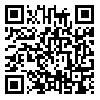یکشنبه 3 اسفند 1404
[Archive]
دوره 12، شماره 4 - ( 7-1403 )
جلد 12 شماره 4 صفحات 306-297 |
برگشت به فهرست نسخه ها
Download citation:
BibTeX | RIS | EndNote | Medlars | ProCite | Reference Manager | RefWorks
Send citation to:



BibTeX | RIS | EndNote | Medlars | ProCite | Reference Manager | RefWorks
Send citation to:
Khanipour H, Yarahmadi F. Countertransference Conceptualization From Freud to Era of Evidence-based Psychotherapies: A Conceptual Review. PCP 2024; 12 (4) :297-306
URL: http://jpcp.uswr.ac.ir/article-1-947-fa.html
URL: http://jpcp.uswr.ac.ir/article-1-947-fa.html
Countertransference Conceptualization From Freud to Era of Evidence-based Psychotherapies: A Conceptual Review. Practice in Clinical Psychology. 1403; 12 (4) :297-306
چکیده: (2985 مشاهده)
Objective: This study aims to explore the concept of countertransference from the early days of psychotherapy to the present.
Methods: Using a conceptual review method, this study examined articles and books in the domains of psychoanalysis and cognitive-behavioral therapy (CBT) from Freud’s time to the contemporary era. The results encompassed definitions, theories, measurement methods, and management strategies related to countertransference.
Results: The results revealed three main perspectives on countertransference, classical, holistic, and process-oriented. Over time, perspectives on this phenomenon have evolved to include behavioral and cognitive elements, such as avoidance, and distorted views of patients as other manifestations of countertransference. Countertransference is now viewed as more than just a reaction that hinders treatment; it is also considered a diagnostic clue to the patient’s personality structure and a valuable tool for gaining insight into treatment. Diverse tools have been to define and assess countertransference. A process-oriented model of countertransference provides a comprehensive framework for conceptualizing predictors and consequences of countertransference. Managing countertransference is a goal in all psychotherapy approaches with different techniques.
Conclusion: The results of this study indicate that the understanding of countertransference has evolved from its origins in psychoanalysis to a trans-theoretical concept embraced by various contemporary approaches. A process-oriented framework for countertransference may effectively integrate diverse theoretical perspectives on the subject.
Methods: Using a conceptual review method, this study examined articles and books in the domains of psychoanalysis and cognitive-behavioral therapy (CBT) from Freud’s time to the contemporary era. The results encompassed definitions, theories, measurement methods, and management strategies related to countertransference.
Results: The results revealed three main perspectives on countertransference, classical, holistic, and process-oriented. Over time, perspectives on this phenomenon have evolved to include behavioral and cognitive elements, such as avoidance, and distorted views of patients as other manifestations of countertransference. Countertransference is now viewed as more than just a reaction that hinders treatment; it is also considered a diagnostic clue to the patient’s personality structure and a valuable tool for gaining insight into treatment. Diverse tools have been to define and assess countertransference. A process-oriented model of countertransference provides a comprehensive framework for conceptualizing predictors and consequences of countertransference. Managing countertransference is a goal in all psychotherapy approaches with different techniques.
Conclusion: The results of this study indicate that the understanding of countertransference has evolved from its origins in psychoanalysis to a trans-theoretical concept embraced by various contemporary approaches. A process-oriented framework for countertransference may effectively integrate diverse theoretical perspectives on the subject.
نوع مطالعه: پژوهشي |
موضوع مقاله:
رويكرد تحليلي
دریافت: 1403/4/30 | پذیرش: 1403/7/2 | انتشار: 1403/7/10
دریافت: 1403/4/30 | پذیرش: 1403/7/2 | انتشار: 1403/7/10
| بازنشر اطلاعات | |
 |
این مقاله تحت شرایط Creative Commons Attribution-NonCommercial 4.0 International License قابل بازنشر است. |



